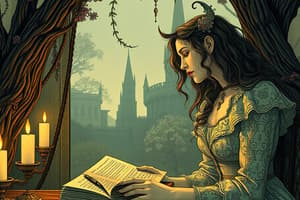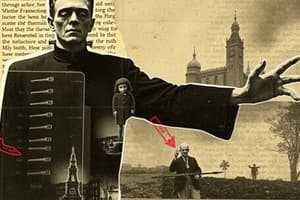Podcast
Questions and Answers
What does Elizabeth's letter express concern about?
What does Elizabeth's letter express concern about?
Victor's illness and encourages him to write to his family in Geneva.
Who has returned to the Frankenstein house after her mother's death?
Who has returned to the Frankenstein house after her mother's death?
Justine Moritz
What tragic news does Victor receive in Chapter 7?
What tragic news does Victor receive in Chapter 7?
His youngest brother, William, has been murdered.
Whom does Victor see lurking near his brother's body?
Whom does Victor see lurking near his brother's body?
How does Justine react to the accusations against her?
How does Justine react to the accusations against her?
What effect does Justine's execution have on Victor?
What effect does Justine's execution have on Victor?
What does Victor contemplate after Justine's execution?
What does Victor contemplate after Justine's execution?
What does Victor decide to see to revive his spirits?
What does Victor decide to see to revive his spirits?
What does the creature want from Victor?
What does the creature want from Victor?
Victor blames the deaths of William and Justine on his creation.
Victor blames the deaths of William and Justine on his creation.
What sobering reminder does the monster give Victor?
What sobering reminder does the monster give Victor?
What is sublime nature described as?
What is sublime nature described as?
What is Mont Blanc?
What is Mont Blanc?
What is the idea of noble savage?
What is the idea of noble savage?
What is the idea of 'Mutability' and who introduced it?
What is the idea of 'Mutability' and who introduced it?
What does Victor call the creature?
What does Victor call the creature?
What does the creature mean by saying, 'Misery made me a fiend'?
What does the creature mean by saying, 'Misery made me a fiend'?
Why doesn't Victor mention the creature to anyone?
Why doesn't Victor mention the creature to anyone?
Who is suspected of murdering William?
Who is suspected of murdering William?
What internal conflict does Victor experience during Justine's sentencing?
What internal conflict does Victor experience during Justine's sentencing?
What effect does nature have on Victor?
What effect does nature have on Victor?
What thought tempted Victor while he was out on the lake?
What thought tempted Victor while he was out on the lake?
What does Victor conclude about the monster when he first sees it?
What does Victor conclude about the monster when he first sees it?
What does Victor witness in the trees during the storm?
What does Victor witness in the trees during the storm?
Flashcards are hidden until you start studying
Study Notes
Chapter Summaries
-
Chapter 6: Elizabeth's letter reveals her concerns over Victor's health and highlights Justine Moritz's return after her mother's death. After recovering, Victor struggles with his studies in chemistry, feeling tormented by the reminders of his past, and decides to return to Geneva.
-
Chapter 7: Victor receives tragic news about his youngest brother, William's murder. His suspicion falls on the monster he created after seeing it near the site of the crime. Justine is wrongfully accused due to a locket found in her possession.
-
Chapter 8: Justine, falsely confessing to save herself, is executed despite her innocence. Victor grapples with guilt over the monster's actions leading to the deaths of two family members.
-
Chapter 9: Overcome with grief after Justine's execution, Victor contemplates suicide but refrains for his family's sake. A family trip to their home provides temporary solace amid his melancholy.
-
Chapter 10: At Montanvert, Victor seeks solace in nature but encounters the monster. Despite his anger, the monster persuades Victor to listen to its story, foreshadowing a deeper connection.
Character Insights
-
Justine Moritz: An innocent character wrongly accused of William's murder, she confesses out of despair and hopes for salvation, highlighting themes of justice and morality.
-
Victor Frankenstein: Experiences a profound inner conflict, burdened by guilt for the deaths caused by his creation. His flight into nature reflects his turmoil and desire for escape.
-
The Monster: Represents the consequences of Victor's actions, expressing its misery and desire for companionship, linking back to themes of nature versus nurture.
Key Themes
-
Nature vs. Nurture: Explores the impact of environment on behavior, exemplified by the monster's transformation into a fiend due to societal rejection.
-
Guilt and Responsibility: Victor's inner struggle over his role in Justine's and William's deaths signifies the weight of responsibility that accompanies creation.
-
Isolation: Characters, especially Victor and the monster, experience profound loneliness, driving their actions and reactions.
Important Motifs
-
Sublime Nature: Nature acts as a source of beauty and reflection for Victor, offering relief yet also serving as a reminder of his internal conflict.
-
The Idea of the Noble Savage: Suggests non-civilized beings may possess inherent goodness, questioning the morality of society and its impact on individuals.
Notable Quotes
- “Misery made me a fiend” - Reflects on the creature's grief and transformation due to rejection, referencing Paradise Lost and the duality of nature vs. nurture.
Additional Concepts
-
Tabula Rasa: Introduced by John Locke, this concept emphasizes the belief that individuals are born as blank slates, acquiring knowledge through experience, relevant in discussions of the monster's development.
-
Mutability: Percy Shelley’s idea illustrating human unpredictability, linking to the themes of change and consequences within the narrative.
Character Relationships
-
Victor and Elizabeth: Their relationship is strained by Victor's secrets and the consequences of his actions, placing Elizabeth in danger.
-
Victor and the Monster: A complex dynamic of creator and creation, highlighting themes of isolation and the search for companionship.
Narrative Techniques
- Use of letters and first-person narratives enhances the emotional depth, allowing insights into characters' thoughts and feelings.
Overall Implications
- Chapters 6-10 of Frankenstein lay the groundwork for exploring deep philosophical themes centered around creation, humanity, and the consequences of one's actions, setting a dark tone that foreshadows future conflicts.
Studying That Suits You
Use AI to generate personalized quizzes and flashcards to suit your learning preferences.




